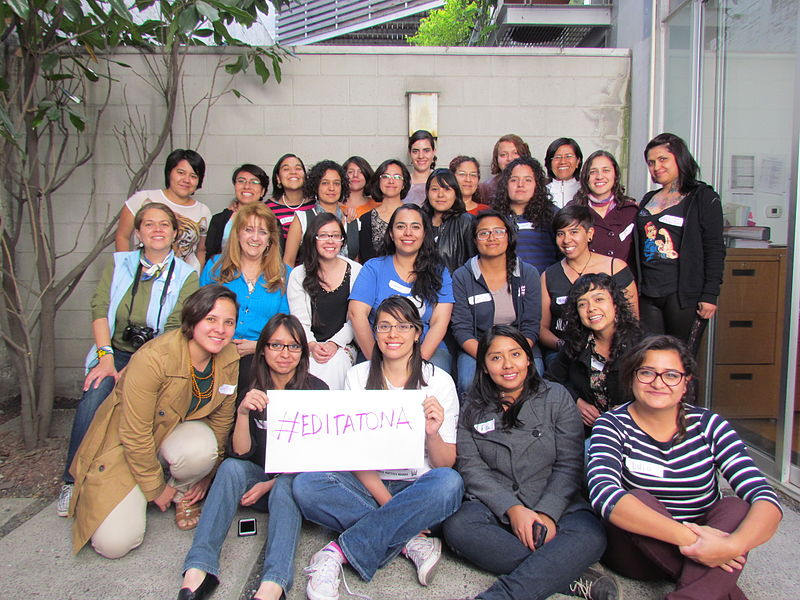This post is a translation of the one I wrote for Mujeres Construyendo in Spanish.
On the one hand, as someone interested in youth and media, I pay reverence to the fact that Wikipedia is always in the top three results for any web search. On the other hand, I’ve had a wikiaccount since I was in high school in 2008… yet, before this year, I hadn’t done one single edit on it.
This confession is useful to put my participation in Wikimania 2015, organized by the stellar Wikimedia México team, in perspective. My impressions aren’t those of a wikimaniac, but those of a carpetbagger editatonera that is happy to have learned lots from this unique insight of the wiki community. I could see how Editatona, our local gender gap editathon, shares the difficulties faced by other wiki-gender projects, and there’s a lot we can learn from those involved in other contexts.
Editatona proudly represented at Wikimania 🙂
The first problem: notability. When we write about women or topics related to gender, one of the main difficulties is to prove that they are notable enough to be deserving of a space on the wiki (and thus avoid takedowns). But in editatonas, it has turned out that there are notable women who have never been referenced in books, and who haven’t received ample media coverage.
In this regard, I found the work of the
WikiProject Women to be huge. It is an initiative aimed at increasing the amount of women bios on the site, and one of its targets are articles on women that are great candidates for deletion for their lack of references. (And, on a more personal note, I thought this WikiProject’s founder,
Rosiestep, to be pretty impressive).
Another useful resource for this (and other) topic(s): we should check the support given by Wikimedia Foundation, and which isn’t little or just monetary. On notability,
The Wikipedia Library helps those of us who aren’t in university anymore (and thus don’t have remote Jstor access anymore) to get resources for everyday editing, or for events.
Something you would obviously spot at Wikimania 😉
Problem 2: the creation of friendly spaces where women feel safe and welcome. The points we have discussed to eternity, from ways to maintain physical security to childcare (and including design based on the color pink) seem to be pretty common.
And related to this topic is the backlash against gender initiatives (and especially women-only spaces, such as Editatona). Practically all the gender initiatives that coexisted at Wikimania have faced all sorts of mansplaining (“this is not the way you’ll solve your problem, women”) and other forms of resistance.
The resource I found surprising in this regard comes from the Wikimedia Foundation itself, and it was made when, in a call for IdeaLab projects (which designated special resources for gender projects), faced a strong community backlash. They started receiving the
same complaints/”questions” all the time (
Editatoneras: we’re not alone), and they decided to write this
fantastic page.
I don’t know about you, but I know I gathered lots of tips and inspiration to bear in mind in the planning of the next Editatona. 🙂
At Wikimania there is a WikiWomen’s lunch, and I swear everyday I fall more in love with women-only spaces.
Note: this has no relationship whatsoever with the text above, but I can’t just not mention how spectacular Wikimedia México’s work was. Most of it was done on a voluntary basis (and super efficiently), and I will always admire the way they cared for their volunteers in the event with awesome T-shirts, meet & greets with Guy Kawasaki and Jimmy Wales, and special events and celebrations. Respect.



